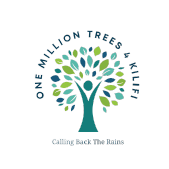
In 2020, my initial visit to Shomani Girls left a lasting impression. The school, then in its infancy, housed just 47 students. Nestled in a semi-arid landscape, it lacked even the most basic amenities, such as shelter from the relentless sun. Despite these challenges, the students, driven by their thirst for knowledge, traversed long distances from the deep village of Madunguni 16 km away from the School, often arriving weary and hungry. I vividly recall the pained expressions on their faces during breaks, a poignant reminder of their daily struggles.
One conversation with a student, let us call her, Halima. unveiled a heartbreaking reality. Halima recounted a journey of over 16 kilometers without breakfast, her only sustenance being a meager portion of porridge the night before. At home, her five siblings endured similar hardships, surviving primarily on cassava, their mainstay since its planting in February 2020. The irony was not lost on me: fertile land lay idle both at the school and their homes, while malnutrition plagued their lives.
Recognizing the urgency of the situation, I realized that simply adhering to the routine of attending classes wasn’t enough to catalyze change for these girls. Their dedication to education was admirable, yet the curriculum only partially addressed environmental issues like tree planting. Determined to make a tangible difference, I pondered on potential solutions.

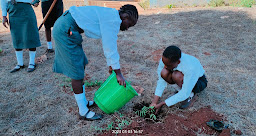
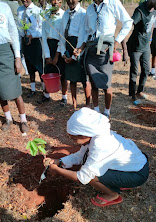
Fast forward to 2022, we seized an opportunity to empower these resilient learners. Educating them on the benefits of tree planting became a catalyst for change. We envisioned a future where the vast expanse of land surrounding the school would not only provide shade but also nourishment and hope. Their eager embrace of our guidance mirrored their determination to thrive despite adversity, igniting a collective spirit of transformation.
The idea to plant trees emerged as a practical step towards providing shade and fostering a greener environment at the school. Rallying support from our local community, we mobilized friends and volunteers to join us in this endeavor. With various groups like Thellesi Trust, Vision Magnet Theater, Green Halo, CJPD, Bayana FM, and Malindi Justice Center coming together, our collective goal was to transform the school grounds into lush green spaces.
However, our efforts faced a formidable challenge. The absence of rain for several months posed a threat to the newly planted trees. Faced with the dilemma of exposing themselves to scorching sun rays to water the trees or risking their survival, the girls found themselves in a difficult situation.
Yet, despite the odds, their resolve remained unwavering. They confronted the harsh reality of climate uncertainty with resilience and determination. It was a stark reminder of the uphill battle they faced not only in pursuing education but also in striving for a better, greener future.
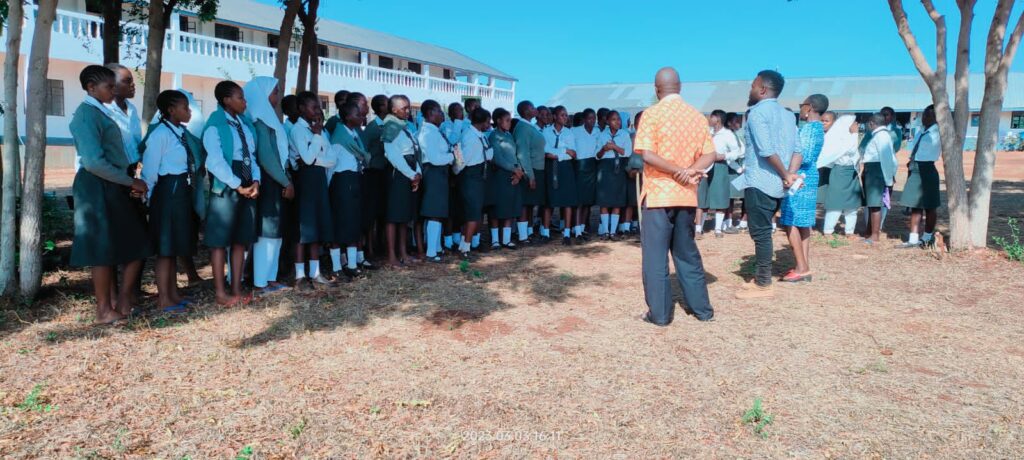
As the positive impact of our tree-planting initiative became increasingly evident in 2023, with 90% of the trees surviving and flourishing, it was clear that our efforts were bearing fruit, both literally and metaphorically. The dedication of the school’s Principal Madam Penninah Mutiso, who led by example by diligently watering the trees each morning and evening, inspired the students to follow suit. Their collective efforts not only transformed the school environment but also instilled a sense of pride and ownership among the girls.
Three years on, the once barren school grounds now boasted vibrant green spaces, offering much-needed shade and respite from the harsh sun. However, despite these visible improvements, a new challenge emerged for the school leadership. It became increasingly apparent that while we had succeeded in nurturing the physical environment, ensuring the nutritional well-being of the students remained a pressing concern.
The stark reality was that many students struggled to access a balanced diet at home, relying primarily on carbohydrates for sustenance. Coupled with the statistics revealing the alarming prevalence of malnutrition in the county, with three out of five children affected, it was evident that the issue extended beyond the school gates.
Addressing this complex challenge requires a multifaceted approach. While our tree-planting efforts enriched the environment, providing fruit trees could offer a sustainable solution to supplement the students’ diets. However, sustaining such initiatives posed financial and logistical hurdles for the school, which operated with limited resources.
Furthermore, the underlying issue of food insecurity and malnutrition highlighted the need for broader community involvement and support. Collaborating with local authorities, NGOs, and community leaders could unlock opportunities for sustainable interventions, such as fruit Orchads in School.
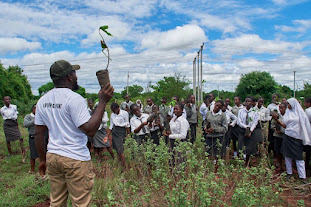

Shomani girls is among the many Schools being affected by the same problem of malnourished kids who have no access to fruit at School and also back at home. In our mission to address malnutrition among school children in Kilifi County, we embarked on a bold initiative to establish fruit orchards across the region. Recognizing the dual benefits of combating malnutrition and mitigating climate change, we set our sights on planting 400 orchards in local schools Shomani Girls serving as the pilot project.
Securing resources proved challenging for our young organization, but a small grant opportunity from The Open Institute provided a breakthrough. With a grant of $1,000, we set out to acquire 300 apple mango trees for Shomani Secondary School, an inspiration of hope in a landscape marked by nutritional insecurity.
Procuring the mango seedlings presented logistical hurdles, as we sourced them from a nursery located 900 kilometers away. Despite the distance and harsh climate conditions, our determination remained resolute. Utilizing buses and motorcycles, we transported the saplings to our workspace at Maono Space in Malindi, eager to begin the transformative journey.
As anticipation mounted, we awaited the dawn of the new school year in January 2024. The arrival of the apple mango saplings symbolized not only the promise of nutritious fruit but also the tangible impact of community-driven initiatives. With each tree planted, we sowed the seeds of change, nurturing the physical landscape and ensuring Halima could access a fruit soon.
Our vision extended beyond mere tree planting; it encompassed a holistic approach to addressing the nutritional needs of the community. By empowering schools with fruit orchards, we aimed to foster healthier, greener environments where students could thrive.
While our journey was far from over, each milestone brought us closer to realizing our vision of a brighter future for Kilifi County. Through perseverance, innovation, and community collaboration, we continued to pave the way for sustainable change, one orchard at a time.
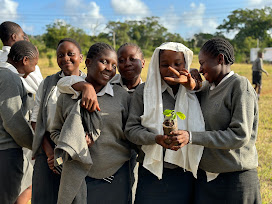
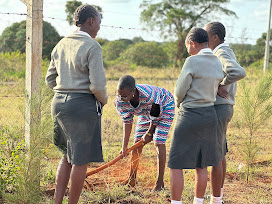
It wasn’t until March, with the arrival of the long-awaited long rains, that we seized the opportunity to fulfill our commitment to Shomani Secondary School. Gathering our dedicated team of 26 members, we embarked on a journey to transport the precious cargo of mango seedlings to the school, situated 16 kilometers from our workspace.
With determination and resourcefulness, we enlisted the help of tuk-tuks to carry the saplings, ensuring their safe arrival at the school grounds. The students’ faces lit up with joy and anticipation as we presented them with the fruit trees promised to them.
Amidst the excitement, we took the opportunity to educate the students on the significance of having fruit trees in their school and the vital role they played in nurturing and safeguarding them. It was a momentous occasion, marking the inception of the first fruit orchard ever established in Kilifi County.
For seven hours straight, we toiled tirelessly, digging holes, enriching the soil with organic manure, planting the mango seedlings, and mulching to retain moisture. With each act of care and dedication, the first orchard in Kilifi County began to take shape, a testament to the collective efforts of our team and the unwavering commitment of the students and the School teachers.
As we stood amidst the newly planted trees, a sense of pride and accomplishment washed over us. It was not just the beginning of a fruit orchard but the dawn of a new chapter in the journey towards a healthier, more sustainable future for the community. With renewed resolve, we looked ahead to the fruits of our labor, both literal and metaphorical, knowing that each tree represented a step closer to realizing SDG 4 Quality Education, SDG 13 Climate Action SDG 2 Zero Hunger.
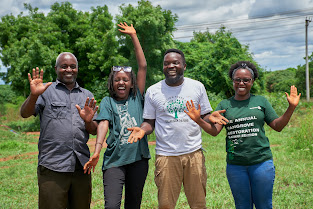
Kanana-Data Intern, Elphic – OMT,
Salama- Rotaract
The benefits of implementing such a program in Schools are manifold. Partnering with schools in my region offers a strategic advantage due to their expansive land, eager student body, and access to water for irrigation. By involving the school-going children in tree-planting initiatives, we not only educate them on environmental stewardship but also extend our influence to the villages they hail from and a sustainable future.
For instance, with the current school population exceeding 400 students, our efforts directly impact 400 villages . Through tree-planting activities and educational sessions, we empower these students to become advocates for environmental conservation and sustainability in their villages.
The creation of a single fruit orchard holds immense significance. Not only does it provide shade and a sustainable source of vitamin A-rich fruits, addressing malnutrition among students, but it also serves as a catalyst for academic engagement. By ensuring that each student receives a piece of fruit daily, we incentivize attendance, foster a love for learning, and promote a culture of environmental responsibility.
Education is widely acknowledged as the gateway to a better future. By instilling values of climate care and environmental stewardship in the younger generation, we pave the way for a more enlightened and environmentally conscious society. By imparting these lessons early on, we ensure that future generations are equipped to safeguard and preserve our precious natural resources for years to come.
Planting fruit trees in schools emerges as the apex of sustainability and cost-effectiveness in transforming communities and fostering climate resilience. By supplying fruit trees to learners, we combat the challenges posed by climate change while cultivating a culture of environmental stewardship.
Our commitment extends beyond Shomani Secondary School to envision a landscape dotted with fruit orchards across Kilifi. Each orchard serves as a beacon of hope, offering shade, sustenance, and a tangible solution to the climate crisis all the way from Shongwani to Ganze to Kaloleni.
Expanding our efforts to establish more fruit orchards in Kilifi aligns with our vision of creating a network of climate-resilient communities. Through strategic partnerships and community engagement, we seek to replicate the success of our initiatives, empowering learners and communities alike to thrive in the face of environmental challenges.

